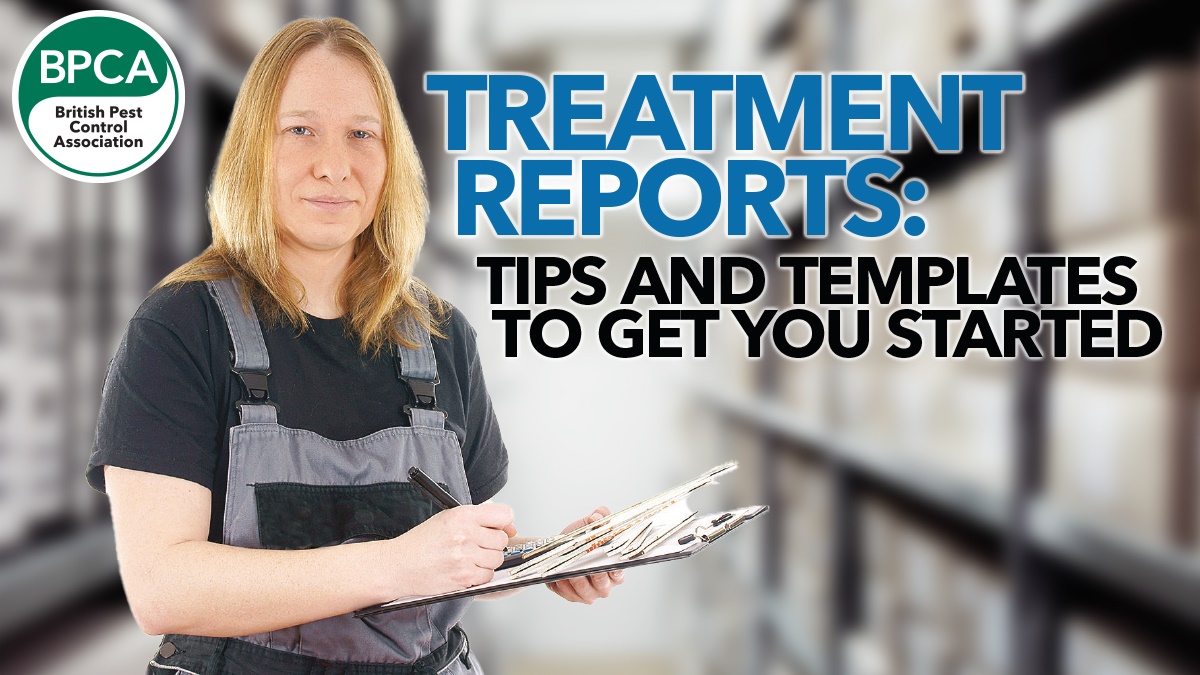PPC110 | Your Association
Paperwork, paperwork, paperwork! Is it all really necessary? BPCA Technical and Compliance Manager Natalie Bungay is here to give you some great reasons to fill in and file those reports.

Sometimes we can create unnecessary processes that only make our jobs that little bit trickier and time consuming. But a treatment report should not be viewed as unnecessary.
It is, in our opinion, one of the most important pieces of paperwork: it will demonstrate your professionalism and could potentially protect your business.
This is why BPCA has created two template treatment report forms for our members to utilise. Whether you are fully digital or still use handwritten treatment methods, this template can help you create the perfect way to communicate with customers.
You can use the template in its raw form or you edit it to add more capabilities – it is up to you. But either way, we are hoping that it at least gives you a good starting point.
Report writing – where to begin
Pest infestations for your customers can cause significant distress, whether they are a commercial or residential tenant. When they place that call with you, they expect one particular thing: for you to get rid of their pest problem.
In the process of doing this, they will also expect you to communicate some specific things. Let’s take a look at this and why the information is important.
When filling out the ‘inspection details’ it can be tempting, when you have been busy all day, to simply say ‘nothing found’ or ‘found XYZ, treatment laid’.
But, is this a good indication of the work you have actually been doing? Does it show the effort you have put into inspecting the site? Probably not. (Well, I hope so anyway!)
A better way to approach it is to think about how the reader of your report will view your ability and your professionalism. Using good English and writing a report that fully describes what you have done is important for you, the business and your customer.
State where you have inspected, what you have and haven’t found, and general observations. Think about noting things that are good – for example, has the customer carried out some good proofing work or housekeeping? If yes then note it.
This shows your good observations, as well as recognising the collaboration between you and your client.
A better way to approach it is to think about how the reader of your report will view your ability and your professionalism.
Natalie Bungay, BPCA Technical and Compliance Manager
Managing expectations
This is a common phrase I use and I believe it to be an important one that we all should remember. Make sure you write down your intended following actions. If it is a call out and you intend to return, then note this in the report and make sure you honour it.
Risk and environmental assessments
You can use your treatment report to demonstrate that you are carrying out health and safety and/or environmental assessments. Noting simple things such as having completed a risk assessment, and that you have observed the significant hazards, will add lots of value to your report.
Always make sure that you include mitigation measures; it’s always great to note hazards but you have to also say what you are doing to reduce the risk!
Your customer must always know what pesticides and products you have used on their site. If using pesticides, always include the active ingredient and quantities.
Too often we see treatment reports with only a ‘trade’ name listed which is not overly helpful in the instance of the customer needing the active ingredient information.
On the dotted line!
Get signatures from the technician and from the customer; all the effort you put into a treatment report can mean nothing if you do not have a customer signature to accompany it.
To offer an example of why: let’s say something goes wrong and a customer tries to blame you for an incident or lack of information.
You will defend yourself by saying “I wrote it in the treatment report” but, if the customer has not signed that report, there is no evidence of you ever providing it.
They could just state that it was never given to them. And think of the times when you've asked your customer to do something that was integral to the success of the treatment (ie vaccuum before flea treatment) and they haven't.
It affects the success levels of your treatment plan, and customers may request extra visits, denying that you gave them the advice at all. With a written report that's signed, you can demonstrate that they were informed and that this is likely why the treatment failed.
And finally…
Take pride in what you do. We all want the industry to be viewed and rightly perceived as being a professional one and so, utilising your treatment report to record your efforts, knowledge and successes will ensure this, as well as protect you, if ever needed.
Templates and more
BPCA members can find the treatment report templates at bpca.org.uk/library
Source: PPC110